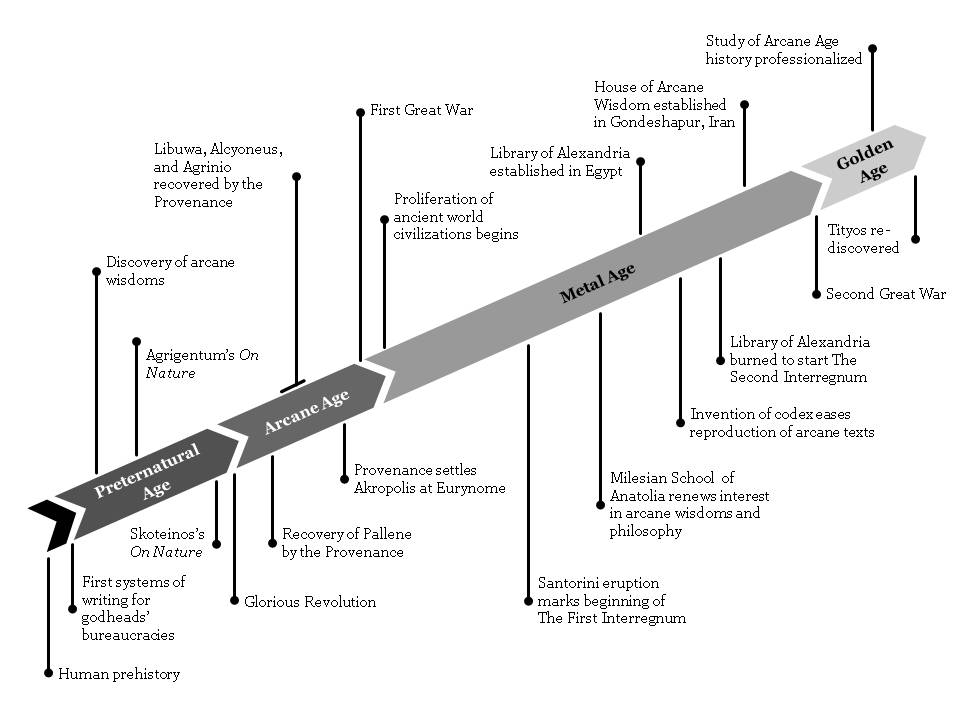Historical Fictionistas (group) on goodreads.com graciously offered the authors among its membership to nominate their own works for the group read in March 2020. I submitted my fictional work, Arcane Cage, believing it qualified per the rules. The moderators however disqualified it as “fantasy,” which I thought meant fantasy elements. Later, in the thread, however, they designated my work as “not HF” [or, not historical fiction]. Having the genre of my work categorized as not historical fiction was of course something I did not anticipate when I participated in the group thread. I find it necessary to correct that first impression for anyone who read the thread.
Arcane Cage is historical fiction. The setting of the narrative is in the distant past, as the timeline of world events (Figure 2, page 12) suggests:

As part of the fiction, I invented an annual calendar for world history divided into four ages (a practice common to the philosophy of history during the European Enlightenment). Certain events — the first civilizations of the world (3000 BCE), the Santorini volcanic explosion (1600 BCE), and references to the Library of Alexandria (265 BCE and 390 CE) — can be dated to the Gregorian calendar. The reader will easily know that the events in my narrative are much older than 50 years, the limit for “historical” according to Historical Fictionistas’ definition.
As for “fiction,” I wrote the the text in the style of Jean d’Ormesson’s, Glory of the Empire, complete with footnotes to actual historical publications and citations of collections in modern institutes of higher learning around the world (masked by anagrams and word plays). Nearly every bibliographical entry in my book is in reference to an actual historical work and/or event. For example, the first three chapters, designed to introduce the “new scholar” to the history of the Provenance, I modeled after Alexis De Tocqueville’s Democracy in America. Later, in the final pages of Chapter 10, I retell a story from Indian War in the Pacific Northwest: The Journal of Lieutenant Lawrence Kip as a conflict that occurred between two defined peoples. There are dozens, if not hundreds, of similar references to historical events fictionalized to suit the narrative I wished to craft about an ancient civilization that I call ” the earliest origins of world civilization.”
Obviously, reference to dwarves, orcs, gnolls, etc., carries the hallmarks (or stigma as it were) attached to the epic fantasy genre. Nonetheless, my utilization of these social designations also departs from the typical depiction in fantasy novels. I treat each of the peoples in my story as a culture, not a race, because I sought to avoid the dehumanization of others as is common in our actual world history. Furthermore, I have a metahistorical explanation (or arch mythology) for the historical existence of these “fantastical” people as members of the homo sapiens tree (not revealed in Arcane Cage). My hope is that readers will have to question their knee jerk or prejudicial identification with one ancient society over others when the conflagration of the First Great War takes place (far from the narrative arc of Arcane Cage).
Lastly, in addition to dropping fictional characters into a historical setting or crafting a fictional narrative based on historical events, Arcane Cage strictly adheres to the historian’s voice. The author does not have a god’s eye perspective on the story. He does not have a first person account or a third person retelling that is not rooted in primary sources cited by the text. Admittedly, this means that not all characters in the narrative develop equally. The critic who wrote the report for the BookLife Prize 2019 had the perspicacity to see that the main character, Sĭddrah, registered the most markers for a character arc or a hero’s journey. The rest of the cast of characters exhibited change over time (history!) in a more limited sense due to a lack of first person journals (left for posterity) or an inattentiveness to the pithy dialog that Sĭddrah recorded in her journals.
This valid criticism aside, I did not intend for Arcane Cage to be a biography of one person. It is the history of a civilization in decline for reasons that the social agents – including the main protagonists – do not fully understand. If that is not historical fiction (and an imitation of current events), I for one do not know what counts as history or as fiction.
